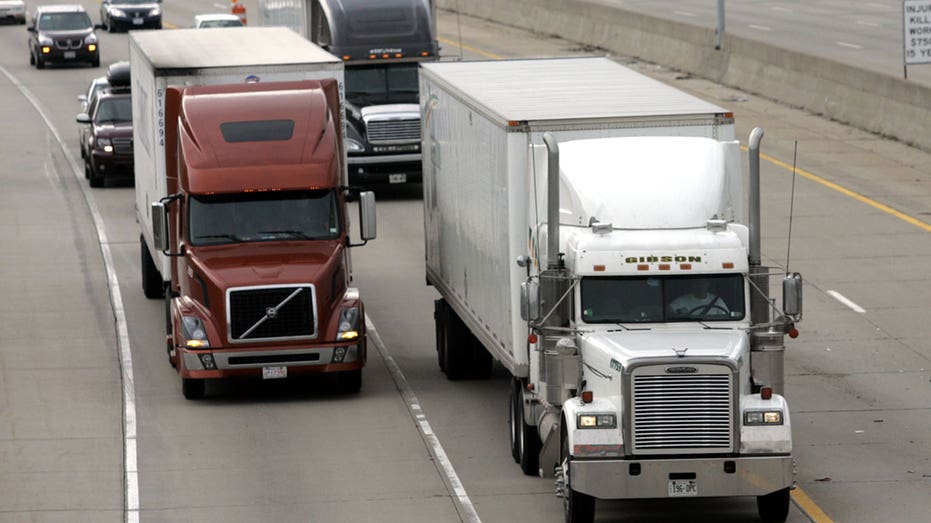Obama-era truck regulations mean layoffs for these companies asking Trump for relief
Trump administration has supported rolling back the regulations, but has not finalized the repeal
Obama administration truck regulations mean more layoffs for companies that manufacture gliders, even though President Trump's administration has supported rolling back the restrictions, business owners told FOX Business.
"The EPA's got everybody up in the air. Nobody knows what to do, so basically everybody's quitting," Pat Stalp, owner of Elkhorn Valley Trucks, told FOX Business.
His business, based in Fremont, Nebraska, has dwindled to four employees from 12 in 2018.
Depending on who you ask, glider kits are boons to the trucking industry that increase fuel efficiency and reliability or relics of a bygone era that are overpriced and overpolluting. A glider truck has a new body but a refurbished engine, leading the Obama administration to classify them as new vehicles and prohibit companies from manufacturing more than 300 gliders each per year.
HUNDREDS OF AMERICAN TRUCKING COMPANIES HAVE FAILED SO FAR THIS YEAR, MORE STILL TO COME

(Photo by Streeter Lecka/Getty Images)
Since EPA has not gone through with a rule change after signaling interest in 2017, companies like Fitzgerald Glider Kits are preparing for the worst. The Tennessee-based company has lobbied for a rule change while going through four rounds of layoffs due to EPA's Obama-era rule. Fitzgerald, a behemoth in the glider industry, has fallen from 700 workers in 2017 to 115.
"Without immediate relief, additional layoffs will be unavoidable," Joe DePew, an attorney with Fitzgerald, told FOX Business.
EPA ENDS SAFETY RULES PUT IN PLACE AFTER DEADLY TEXAS BLAST
EPA was working on "a rule for the glider industry that better balances economic growth alongside continued environmental progress," former EPA spokesman James Hewitt told the Daily Caller News Foundation in October 2018. The rule was expected to come out in late 2019, a source told the DCNF.
Economist Nicholas Loris of the Heritage Foundation advocated for repealing the 2016 Obama-era regulation on glider trucks in a report published earlier in 2019.

Republican presidential candidate Donald Trump speaks during a coal mining roundtable at Fitzgerald Peterbilt, Wednesday, Aug. 10, 2016, in Glade Spring, Virginia. (AP Photo/Evan Vucci)
"Truckers are the definition of small business. The previous administration's fuel economy mandates for new heavy duty trucks put the technological cart before the horse and resulted truckers getting stuck with maintenance costs reaching thousands, if not tens of thousands of dollars per business," Loris told FOX Business.
WHY MORE WOMEN ARE TAKING TRUCKING JOBS
"A more pragmatic approach would be for the EPA to conduct an up-to-date lifecycle assessment and analyze the glider kit sales in the proper context," he said. "That is, the EPA should consider the environmental impacts of truckers keeping their trucks on the road longer (or purchasing used trucks) instead of buying new trucks due to the costs and documented maintenance and reliability problems associated with new trucks."

Reuters
Glider kit companies continue to wait. Jerry Hoover of Hoover Trucks in Ohio said he will not have to initiate any layoffs, but the glider kit rule kept him from hiring more employees, he told FOX Business.
"We would have expanded I don't know how fast. We could sell all the gliders we could produce," Hoover said. "Right now, our business is 80 percent in gliders and has been for the last number of years, close to 10 years."
He says Hoover Trucks will "probably" switch to rebuilding new trucks that have been in wrecks.
GET FOX BUSINESS ON THE GO BY CLICKING HERE
"These new trucks are just not reliable. ... That's why it needs to be rolled back and repealed," Hoover said. "Truck drivers want efficiency. They're not opposed to that, but they need reliability."
The White House referred FOX Business to EPA for comment. EPA referred FOX Business to a notice of proposed rulemaking initiated in 2017.




















